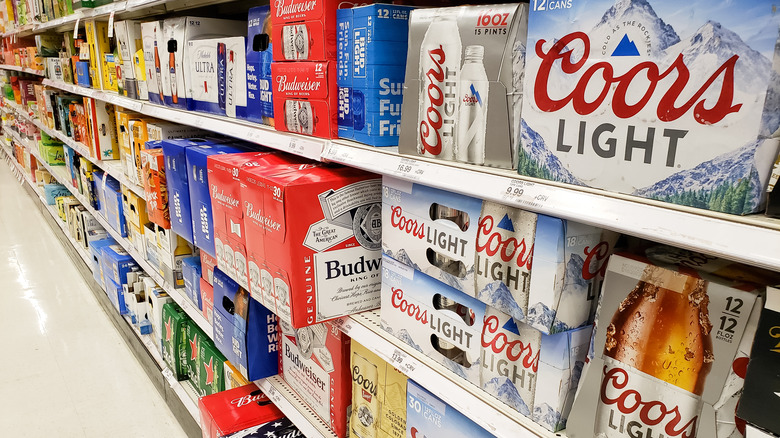As Shoppers Switch To Cheaper Brands, These Alcohol Sales Remain Steady
The number of breweries in the United States topped 9,000 in 2021, according to VinePair – a far cry from the modest 49 that The Takeout reports were around in 1977. In addition to a growing amount of options, different buying habits and brand loyalties have developed over the years, and beer has remained a bull market, surpassing $100 billion last year, per the Brewers Association.
Even rising inflation has been unable to curb Americans' taste for suds, despite what Bloomberg reported as the biggest annual percentage bump in grocery store prices since 1980. In fact, in what must be regarded as something of an anomaly, FoodDive reports American consumers aren't even turning from their go-to brands to cheaper beer options.
"We haven't seen [a shift down to lower-price beers] yet," Molson Coors Beverage CEO Gavin Hattersley explained in an interview last May (via FoodDive). "It wouldn't surprise me if it happens as inflation, gas prices, and things start doing really bad. But we haven't seen it."
Beer sales remain strong as inflation increases
The continued success of beer brands is something of an outlier in this regard because inflation – driven by supply chain issues exacerbated by both the coronavirus pandemic and the war in Ukraine — has caused many consumers to seek lower cost or discounted items in lieu of their supermarket standards, according to the Wall Street Journal.
But this hasn't happened — at least not yet — when it comes to beer. To the contrary, speaking on an earnings call Hattersley noted that Molson Coors' first quarter numbers in 2022, on a dollar share trend basis, were the best they've been in seven years. Yahoo Finance, meanwhile, observed that Molson Coors surpassed its estimated earnings in the first quarter, showing a 16.7% rise in net sales. These robust numbers for the beverage company are an important indicator, as they are the fifth-largest brewing company in the world, per Beer Connoisseur.
In analyzing inflationary pressures in the beer market, Seeking Alpha described the product as "recession-proof." Although the financial outlet noted that more than 700 new breweries have opened for business since 2019, it believes rising costs from inflation may help legacy brands like Molson Coors and Anheuser-Busch (the world's largest brewing company, based in Belgium since its 2008 merger with InBev, per the New York Times) regain some of the market share they've lost in recent years to craft beer. In addition to increasing prices, inflation may also force some smaller breweries to close their doors, leading consumers back to larger companies.

